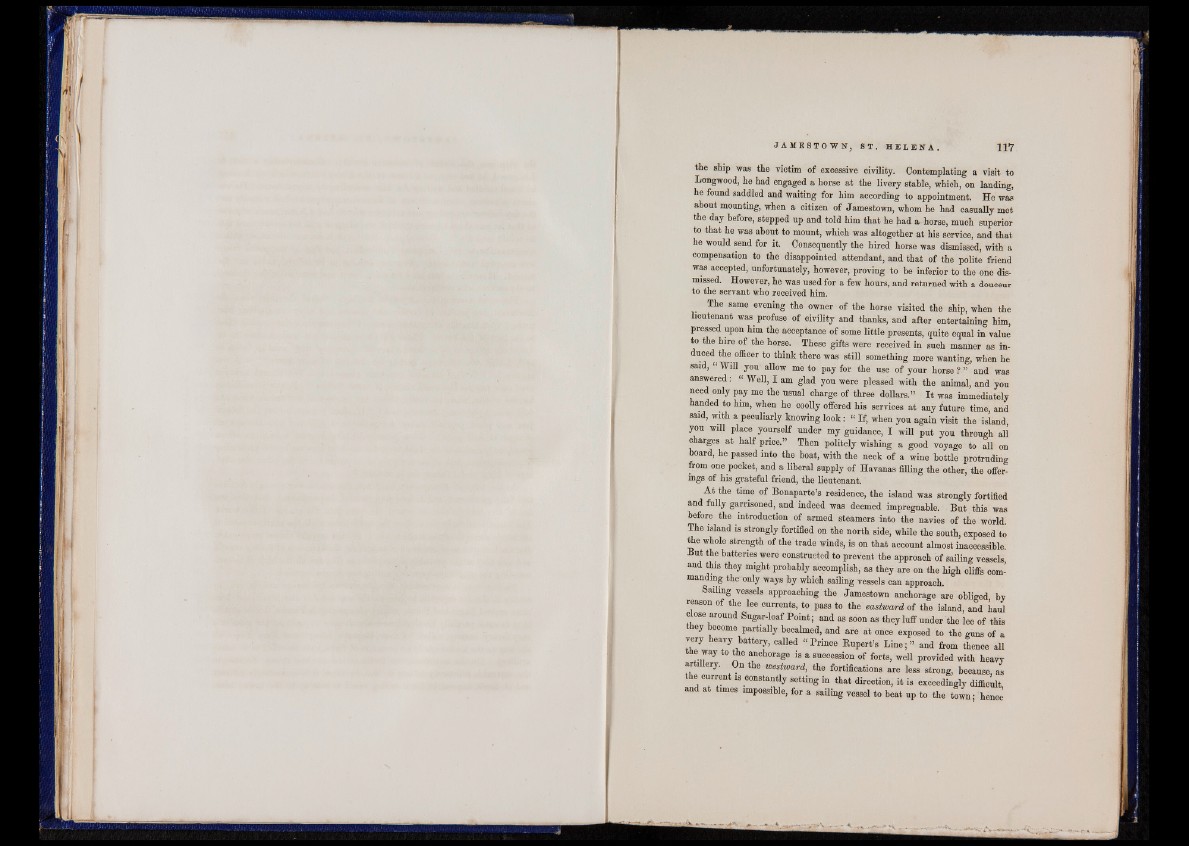
J A M E S T O W N , ST. H E L E N A . 117
the ship was the victim of excessive civility. Contemplating a visit to
Longwood, he had engaged a horse at the livery stable, which, on landing,
he found saddled and waiting for him according to appointment. He was
about mounting, when a citizen of Jamestown, whom he had casually met
the day before, stepped up and told him that he had a horse, much superior
to that he was about to mount, which was altogether at his service, and that
he would send for it. Consequently the hired horse was dismissed, with a
compensation to the disappointed attendant, and that of the polite friend
was accepted, unfortunately, however, proving to be inferior to the one dismissed.
However, he was used for a few hours, and returned with a douceur
to the servant who received him.
The same evening the owner of the horse visited the ship, when the
lieutenant was profuse of civility and thanks, and after entertaining him,
pressed upon him the acceptance of some little presents, quite equal in value
to the hire of the horse. These gifts were received in such manner as induced
the officer to think there was still something more wanting, when he
said, “Will you allow me to pay for the use of your horse?” and was
answered: “ Well, I am glad you were pleased with the animal, and you
need only pay me the usual charge of three dollars.” I t was immediately
handed to him, when he coolly offered his services at any future time, and
said, with a peculiarly knowing look: “ If, when you again visit the island,
you will place yourself under my guidance, I will put you through all
c arges at half price.” Then politely wishing a good voyage to all on
board, he passed into the boat, with the neck of a wine bottle protruding
from one pocket, and a liberal supply of Havanas filling the other, the offerings
of his grateful friend, the lieutenant.
At the time of Bonaparte’s residence, the island was strongly fortified
and fully garrisoned, and indeed was deemed impregnable. But this was
before the introduction of armed steamers into the navies of the world.
The island is strongly fortified on the north side, while the south, exposed to
the whole strength of the trade winds, is on that account almost inaccessible.
But the batteries were constructed to prevent the approach of sailing vessels,
and this they might probably accomplish, as they are on the high cliffs commanding
the only ways by which sailing vessels can approach.
Sailing vessels approaching the Jamestown anchorage are obliged, by
reason of the lee currents, to pass to the eastward of the island, and haul
close around Sugar-loaf Point; and as soon as they luff under the lee of this
they become partially becalmed, and are at once exposed to the guns of a
very heavy battery, called “ Prince Rupert’s L in e ;” and from thence all
the way to the anchorage is a succession of forts, well provided with heavy
artillery. On the westward, the fortifications are less strong, because, as
e current is constantly setting in that direction, it is exceedingly difficult
and at times impossible, for a sailing vessel to beat up to the town; hence